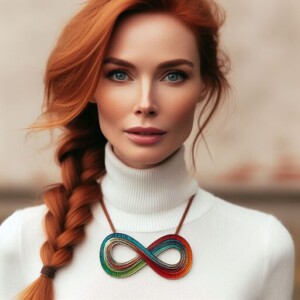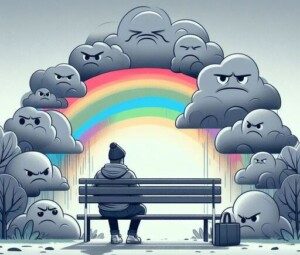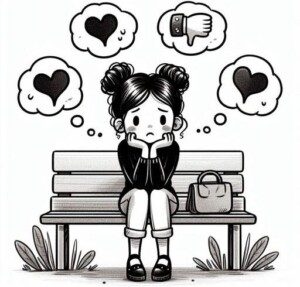Many autistic people believe nobody likes them even though this may be false, but it doesn’t mean it can’t be true, either.
Autistics are at the mercy of a world ruled by neurotypicals simply because we are vastly outnumbered by the NTs.
Understanding why some autistic individuals feel as though nobody likes them involves exploring a complex interplay of psychological, social and neurological factors.
Autistic individuals typically experience difficulties in social communication and interaction, which can lead to feelings of isolation, misunderstanding and rejection.
These challenges can contribute to a pervasive sense of not being liked or accepted by others.
It’s fairly common for autistic adults to recall their young school years feeling that “nobody likes me.”
Our Second Language Is Neurotypical

One of the core features of autism is difficulties in understanding and navigating social situations, which can result in social anxiety and/or bitterness or anger towards people, and feelings of alienation.
Autistics may struggle to interpret social cues such as facial expressions, tone of voice and body language, making it difficult for them to establish and maintain relationships.
Compounding this experience is when the Autist isn’t aware that they are failing to read social cues or effectively navigating social situations.
For example, there’ve been many instances in which I had received negative feedback from a third party, that I had been rude to another individual or was somehow off-putting to them – even though I had not felt any negativity towards that person or even sensed that they were being rubbed the wrong way by me.
I’d be like, What’d I say?! I’d blame the other person for either misreading me or being overly sensitive.
A question that many undiagnosed Autistics ask themselves through various phases of their lives is, “Why doesn’t anyone like me?”
Furthermore, autistic people often have unique interests and preferences that don’t align with those of their neurotypical peers.
All throughout adulthood, I’d reflect upon how “I like to talk about things that nobody else does,” and, “The things people like to talk about rarely interest me.” Yet it had never dawned on me that I might be autistic until well into middle age.
This divergence in interests, that affects so many autistic people, can lead to feelings of isolation and exclusion, as autistic individuals may struggle to find common ground with others or participate in typical social activities.
One of the factors that isolated me from other female classmates in high school was that I had no interest in their favorite topics of conversation: what happened at the latest party, boyfriend problems, boys in general, crushes on popular recording artists, makeup, fashion and hot TV stars.
I would have much rather discussed severed spinal cords, shark attacks, The Incredible Hulk and the physical feats that humanoids from a planet with heavier-than-earth gravity could do here on earth.
Additionally, the sensory sensitivities commonly associated with autism can make certain social environments overwhelming or distressing, further contributing to feelings of discomfort and withdrawal.
Feeling Disliked by Everybody

©Lorra Garrick
The experience of feeling disliked or unaccepted by others can have profound psychological consequences for autistic individuals.
Repeated experiences of rejection or ostracism can erode self-esteem and lead to a negative self-concept, reinforcing the belief that one is inherently unlikeable or unworthy of acceptance.
When I was 13, I had an epiphany. I began realizing that there was nothing wrong with me.
Instead, the better and more logical explanation for feeling so disliked by my peers and even teachers and having no true friends was that everyone ELSE had the problem: being stupid, immature, annoying and/or boring.
My approach may come across as arrogant, but it was a coping tactic.
A much more common coping tactic among Autistics, especially female, is that of masking: mimicking neurotypical behaviors to fit in.
I found my approach to be far more easier than acting (masking) like my peers.
Masking may sound easy, but many Autistics will tell you that years of faking neurotypical has led to mental exhaustion, cognitive burnout — even physical exhaustion after singular social events.
Stereotypes of Autism Don’t Help
Stereotypes portraying autistic individuals as socially awkward, aloof or unemotional can contribute to stigma and prejudice, making it difficult for them to feel understood and valued by others.
The pervasive lack of autism acceptance and inclusion in mainstream society can further marginalize Autistics and reinforce their sense of being outsiders.
Messages from society, media and even people with good intentions — that emphasize deficits rather than strengths — can contribute to feelings of shame and inadequacy.
An autistic person may internalize negative stereotypes and view themselves through a lens of deficiency, further fueling feelings of unworthiness and social alienation.
What can be done?
Addressing the issue of feeling disliked or unaccepted requires a variegated approach that addresses both individual and systemic factors.
There needs to be autism acceptance and understanding within society at large.
This entails picking bones about stereotypes and promoting positive portrayals of autism in media, education and public discourse.
In conclusion, the experience of feeling disliked or unaccepted by others among autistic people is multifaceted and influenced by a combination of internal and external factors.
 Lorra Garrick has been covering medical and fitness topics for many years, having written thousands of articles for print magazines and websites, including as a ghostwriter. She’s also a former ACE-certified personal trainer. In 2022 she received a diagnosis of Level 1 Autism Spectrum Disorder.
Lorra Garrick has been covering medical and fitness topics for many years, having written thousands of articles for print magazines and websites, including as a ghostwriter. She’s also a former ACE-certified personal trainer. In 2022 she received a diagnosis of Level 1 Autism Spectrum Disorder.
.










































